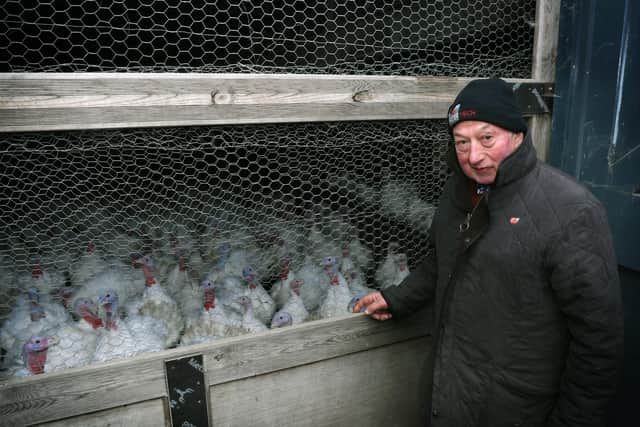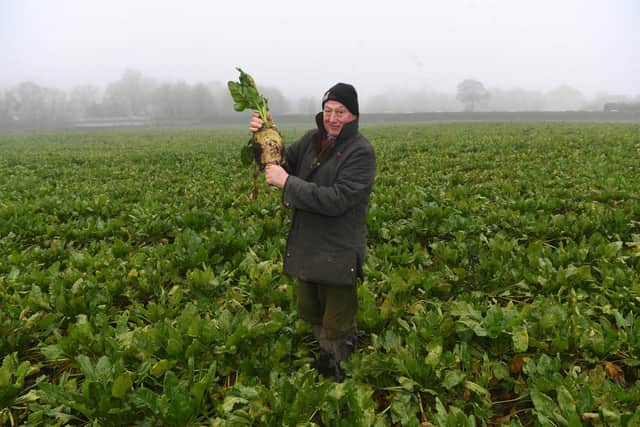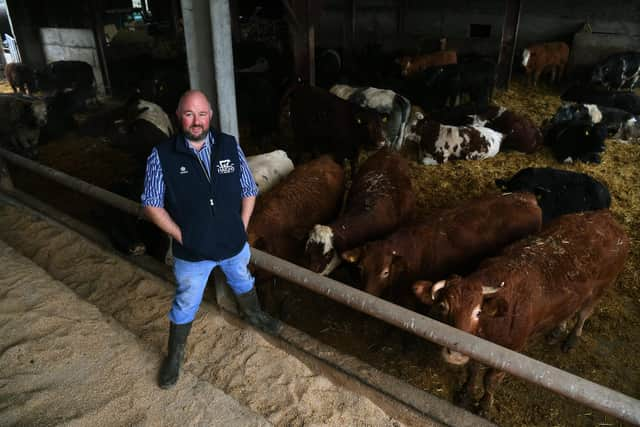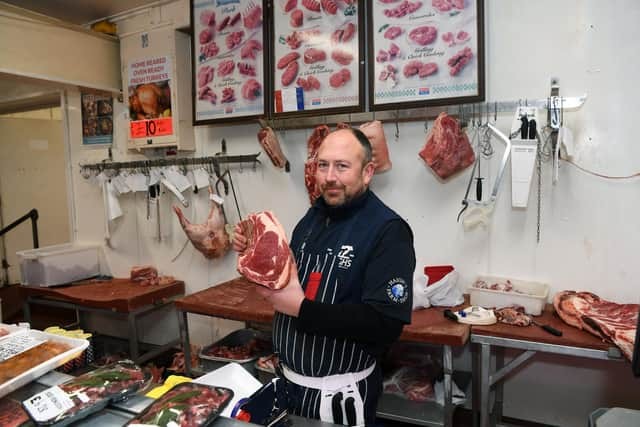Farm of the Week: Sheep farmer on a mission to bring back woollen blankets to solve heating bills crisis
He’s currently engaged in harvesting fodder beet that is grown to feed his herd of around 400 cattle on 28 acres to the other side of the River Calder at Holme Bank Mills, which was once one of a number of mills owned by James Walker Textiles in the heyday of West Yorkshire’s Heavy Woollen industry.
Only the chimney and the bottom two storeys remain from those days when blanket manufacture was massive in the Calder Valley and when the original James Walker started out with two handlooms in a weaver’s cottage in 1810.
Advertisement
Hide AdAdvertisement
Hide AdRichard bought the land and buildings on the north side of the river three years ago where James Walker Textiles still trades today, but largely now with foreign manufacture and different fibres, and he feels that the return of wool and woollen blankets could solve some of the UK’s heating problems.


“It’s only my opinion, but it was in the 1960s people started installing central heating for every room of their house instead of just having a fire in the kitchen and living room. If there wasn’t heating in bedrooms and there was just heating in the living room and kitchen people could still put woollen blankets on the bed and it would save on people’s heating bills.
“It would be good for the sheep farmers. Wool used to be worth a fortune, now it’s worth nothing. If we returned to wool for such as blankets it would help reduce global warming as we wouldn’t be using as much gas.
“The current James Walker’s ancestors were handloom weavers weaving blankets in Heckmondwike and carrying the finished blanket to Leeds in 1830 before the Industrial Revolution started. Heckmondwike had its own Blanket Market and its own Blanket Hall to sell the blankets.
Advertisement
Hide AdAdvertisement
Hide AdRichard’s own contribution to farming history came when he was part of the new freezer generation in the 70s when he and many other farmers and butchers grew their businesses on the back of refrigeration of meat by the public.


“I started working at the slaughterhouse in Bradford in 1960, straight from school. I’m from Mirfield and at 10 years old I had decided I wanted to be a farmer, not just a farm worker but a farmer.
“In 1975 I opened a butcher’s shop. It was when people started buying freezers and we did a roaring trade in people buying bulk meat. They were buying half a pig, a hind of beef, whole lambs. We outgrew it in twelve months and moved to a bigger shop in Mirfield which we still own.
“I’d started renting land for my own stock for the shop. I’d bought the farmhouse and buildings, about an acre altogether, at Elm Grove Farm, which became the farm shop at Mirfield, in 1969 and then bought another 8 acres of land there from Sir John Armitage who owned Kirklees Estate in 1977.
Advertisement
Hide AdAdvertisement
Hide Ad“We’ve bought land and farms at various times since and we now own 330 acres across three farms including Cockley Hill Farm, Kirkheaton which we bought in 2006 that adjoins New Hall Farm that we had bought in 2004, and we have other isolated blocks of land all within around three miles of base, plus we rent other land including 60 acres at Brighouse.


Richard said that he oversees the farm, farm shop and properties now owned on the industrial estate where James Walker Textiles is based, and that his two sons George and Charles and their wives Sarah and Marieke all play their part.
“George runs the farm shop alongside his wife Sarah. Charles works with George in the shop in the mornings and then he’s on the farm in the afternoon and has main responsibility. His wife Marieke runs the property company.
“We are all about cattle and sheep, buying in as stores and fat. Our cattle are mostly Limousin-crosses and we buy stores from Ruswarp, Leyburn, Longtown and Lancaster and fat cattle when needed from Selby. We buy stores at about 15 months old and take them through to 25-30 months. We also have some Belted Galloways that are outwintered on the land at Brighouse. We will take them to over 30 months. We keep around 400 cattle overall and we are pretty self-sufficient in them at the moment.
Advertisement
Hide AdAdvertisement
Hide Ad“We buy store cattle in autumn, over-winter them and they start becoming fat from August onwards. The ones that don’t get fat on the grass we finish off inside from October.


“They all go through the shop. We will be processing 20-plus per week up until Christmas as this is generally our busiest period.
Richard buys fat lambs in Holmfirth livestock market and pigs at Selby livestock market every week.
“We try to keep food miles down to a minimum by using the closest livestock markets for buying and closest abattoirs for processing. The fat lambs go to Leonard Wood & Sons at Scammonden, cattle go to Spenborough abattoir at Liversedge and the pigs to John Penny in Rawdon.
Advertisement
Hide AdAdvertisement
Hide AdWhile this week has been all about harvesting the fodder beet all around the former textile mill the Haigh family also grows 80 acres of wheat and barley which is mixed into a ration for the cattle by renowned mill and mix specialists Peter Rhodes of Storwood.
“Every crop we grow is for feed,” said Richard. “Including grass for both grazing and silage for the cattle, and every animal we finish goes through the farm shop.
Richard said that the first lockdown brought about a much busier trade in the spring and early summer of 2020 and that the increased number of people it brought has been maintained.
“When lockdown came we were busier than we would normally be at Christmas. More people came to the farm shop and have carried on coming.
Advertisement
Hide AdAdvertisement
Hide Ad“We are now just starting on this year’s Christmas rush. Charles was judging stock at the Christmas Primestock Show at Skipton yesterday. We also have our own turkeys that we will be preparing for the shop in two weeks’ time. We grow forced rhubarb in the shed where the turkeys are once they’re gone.
Richard said that his thoughts about a return to woollen goods and a better price for sheep farmers for the wool were also on his mind as Christmas approaches.
“We grow Christmas trees and local schools buy them. It always seems red hot when we go in with them. Maybe they’d be better off turning the heating down and buying them all a wool jumper.
Richard’s wife Catherine passed away four years ago. He has eight grandchildren and there’s no surprise what they may be getting for Christmas this year.
“I’m sure they’ll all be happy with a blanket and a woolly jumper,” said Richard. “I think Catherine would have approved.